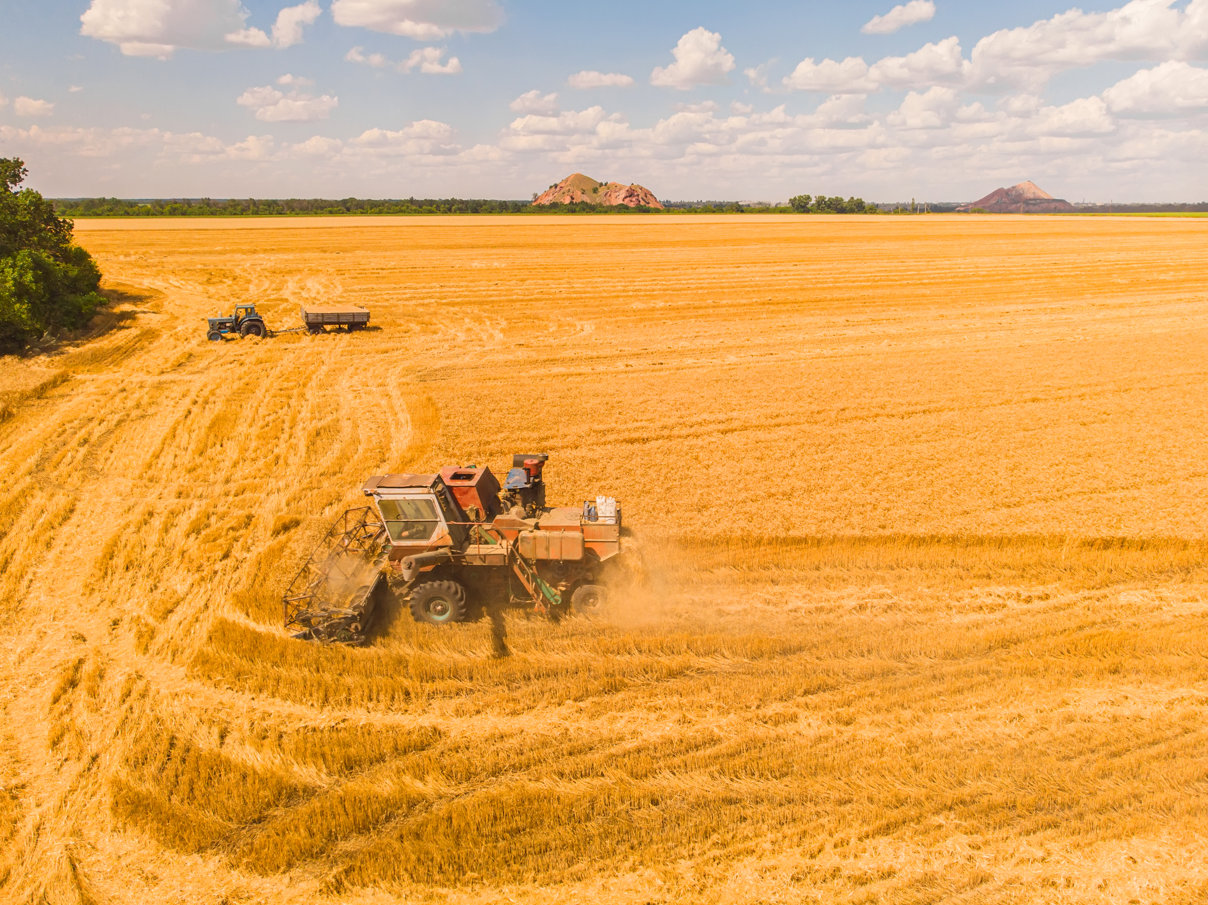
Agriculture in Turkey has significant development potential due to its diverse territory and employs more than 18% of the country’s working population.
Agriculture In Turkey
Overview of Turkish Agriculture
Turkey, a country straddling both Europe and Asia, has long been praised for its extensive agricultural history. With a favorable climate, fertile soils, and abundant water supplies, Turkey’s agricultural sector is a cornerstone of its economy and a major player in the global market. This article examines current trends, challenge, and opportunities in Turkish agriculture, providing information to investors and stakeholders wishing to engage in this dynamic industry.
Turkey’s agricultural sector is diverse, ranging from basic crops such as wheat and barley to specialized products such as beans, cherries and figs. Turkey is the world’s largest producer of apricots and cherries, and a major producer of hazelnuts and figs. The country’s varied climate allows the cultivation of a wide range of agricultural products, making it an important agricultural center in the region. Agriculture in Turkey
On May 17, President Recep Tayyip Erdoğan highlighted Turkey’s significant progress in agriculture over the past 21 years, despite challenges such as fluctuating meat prices and rising fertilizer costs. While highlighting the importance of sustainable agriculture and global food security, Turkey’s role in facilitating the safe passage of 33 million tons of cereals through its straits can be noted.
General Statistics And Economic Impacts
- Gross value of production: The gross value of the Turkish agricultural market is expected to reach $61.31 billion in 2024. An annual growth rate of 2.66% is expected, resulting in a gross output value of $69.90 billion by 2029.
- Cereal production: Turkey is a major producer of various cereals, especially barley. During the marketing year 2023-2024, Turkey ranks sixth among the main producers of barley, with an estimated production of eight million tons. In addition, the country’s cereal production peaked in 2023 at 42.2 million metric tons.
- Vegetable production: vegetable production in Turkey has been growing steadily over the years. In 2023, Turkish farmers produced approximately 31.8 million metric tons of vegetables. Turkey is also one of the world’s leading tomato producers, recording a harvest volume of more than 13 megatons by 2023
- Animal livestock: In terms of husbandry, Turkey has almost 69 million animals, including sheep, cattle, goats and buffalo. The total number of sheep was the highest among animals, rising to over 42 million in 2023. In addition, poultry meat production capacity rose from 1.5 million metric tons in 2010 to 2.4 million tons in 2023.
- Turkey Aquaculture production: As a country surrounded by sea on three sides, fishing is an important industry for Turkey. The country reached a peak aquaculture production of 1.7 million tons in 2023, up 18.6% on the previous year. European anchovy production increased by 117%, while Turkish salmon production rose by 45%. Policies and support from the Ministry of Agriculture and Forestry contributed significantly to this growth. The country also exported $1.7 billion worth of aquaculture products to around 100 countries. Efforts continue to ensure sustainable farming of species such as sea bass and mussels. Agriculture in Turkey
- Agriculture trade: Turkey’s trade balance in agricultural products exceeds $2.3 billion in 2022. Of the country’s exports, cereals accounted for the largest share in 2022, at 44.5%. Turkey is also known as one of the major producers and exporters of cotton. In 2022/2023, 180,000 tons of cotton were sold worldwide, placing Turkey seventh in the world.
Principal Agricultural Regions In Turkey
Turkey is rich in agricultural diversity due to its varied climate and geography. Here are some of the main agricultural regions of Turkey and their production: Agriculture in Turkey
- Aegean region: Izmir, Aydın, Manisa and Denizli. Agriculture in Turkey
Production: olives, figs, grapes, tobacco and cotton.
- Mediterranean region: Antalya, Adana and Mersin. Agriculture in Turkey
Production: corn, bananas, vegetables and cotton.
- Central Anatolia Region: Konya, Ankara and Eskişehir. Agriculture in Turkey
Production: cereals (wheat, barley), beets.
- South-East Anatolia Region: Şanlıurfa, Diyarbakır and Gaziantep. Agriculture in Turkey
Production: cotton, wheat, lentils and pistachios.
- East Anatolia Region: Erzurum, Van and Malatya. Agriculture in Turkey
Production: livestock (sheep, cattle), dairy products and cereals.
- Black Sea region: Rize, Trabzon and Samsun. Agriculture in Turkey
Production: tea, nuts, tobacco and maize.
- Marmara Region: Bursa, Tekirdağ and Balıkesir. Agriculture in Turkey
Production: vegetables, fruits and dairy products.
These regions make a massive contribution to Turkish agricultural production, each offering specific products due to their unique climatic and geographical conditions. Agriculture in Turkey
Technological Development In Turkey Agriculture
 The adoption of modern agricultural technologies in Turkey is increasing, reflecting a wider global trend towards precision agriculture. The integration of state-of-the-art technology in every stage of agricultural production is essential for increasing both productivity and quality. Key technologies such as vertical farming, land-free farming and advanced irrigation systems are transforming traditional farming methods, making them more efficient and sustainable. These innovations not only address the challenges of climate change, but also significantly increase agricultural production. High-tech solutions are essential to combating the adverse effects of climate change while ensuring food security. The use of advanced technology by Turkey also extends beyond traditional agriculture.
The adoption of modern agricultural technologies in Turkey is increasing, reflecting a wider global trend towards precision agriculture. The integration of state-of-the-art technology in every stage of agricultural production is essential for increasing both productivity and quality. Key technologies such as vertical farming, land-free farming and advanced irrigation systems are transforming traditional farming methods, making them more efficient and sustainable. These innovations not only address the challenges of climate change, but also significantly increase agricultural production. High-tech solutions are essential to combating the adverse effects of climate change while ensuring food security. The use of advanced technology by Turkey also extends beyond traditional agriculture.
Agriculture in Turkey
Intelligent Agriculture Technics Turkey
 Precision agriculture, which includes the use of GPS technology and the Internet of Things (IoT), optimizes resource use, improves yields and reduces the environmental footprint of agricultural practices in Turkey.
Precision agriculture, which includes the use of GPS technology and the Internet of Things (IoT), optimizes resource use, improves yields and reduces the environmental footprint of agricultural practices in Turkey.
Turkey is exploiting artificial intelligence (AI), drones and digitization to improve productivity, food security and exports in its agricultural sector while preventing food losses. The country exported $26.5 billion in agricultural products in 2023 and aims to increase that amount to $50 billion in the next five years. The Aegean exporter associations are key players, implementing numerous sustainability and marketing projects aimed at increasing Turkey’s share of agricultural exports from 22% to 30%.
Advances in Sustainable Crop Management
The World Bank has granted $30 million to the organized agricultural specialized industrial zone of Dikili (Dikili TDIOSB) in Turkey. This area, one of the largest geothermal-heated agricultural industrial areas in Europe and Turkey, covers 3 million square meters and includes 50 high-tech greenhouses and 47 industrial facilities. It is expected to contribute 1.6 billion Turkish pounds a year to the national economy when fully operational, with an emphasis on sustainability and women’s employment. The project is expected to be completed by the end of 2025.
In forest management, unmanned aerial vehicles and specialized firefighting equipment are used to effectively combat forest fires. Turkey is thus seeking to modernize its agricultural sector and increase its resilience to environmental challenges.
By adopting these advances, Turkey is setting the standard for sustainable agriculture, ensuring that productivity and environmental protection go hand in hand.
Organic farming in Turkey
In addition to the ongoing economic development in the conventional agriculture sector, there is a growing trend in biographical agricultural production in Turkey, driven by the domestic and international demand for organic products. Turkey’s organic agricultural land has increased significantly over the past decade, making it one of the best countries in Europe in terms of organic farming area.
Overview of Organic Growth in Agriculture in Turkey
 Turkey has exceeded $1 billion in organic exports, producing 1.6 million tons of organic goods in 268 different products, including dried, fresh and frozen fruits and cotton. The country aims to raise its exports of organic products to $1.5 billion and, in the long run, to $2 billion. With about 53,000 organic farmers, Turkey ranks fourth in Europe. Exporters are increasing their presence at international fairs, such as BioFach in Germany, in order to expand their market. Organic farming in Turkey is therefore a great investment opportunity.
Turkey has exceeded $1 billion in organic exports, producing 1.6 million tons of organic goods in 268 different products, including dried, fresh and frozen fruits and cotton. The country aims to raise its exports of organic products to $1.5 billion and, in the long run, to $2 billion. With about 53,000 organic farmers, Turkey ranks fourth in Europe. Exporters are increasing their presence at international fairs, such as BioFach in Germany, in order to expand their market. Organic farming in Turkey is therefore a great investment opportunity.
Germany Wants to Increase Trade Investment in Organic Products with Turkey
 During the German-Turkish Economic Food Day in June, 2024, organized in collaboration with the German Embassy in Ankara and the Aegean exporter associations, discussions highlighted the high demand for Turkish organic products in Europe. Germany aims to deepen cooperation throughout the food supply chain, from production to logistics. In Germany, there is a growing market for gluten-free and sugar-free products, which offers new opportunities for Turkish exporters. Turkey aims to boost its trade relations with Germany to $60 billion.
During the German-Turkish Economic Food Day in June, 2024, organized in collaboration with the German Embassy in Ankara and the Aegean exporter associations, discussions highlighted the high demand for Turkish organic products in Europe. Germany aims to deepen cooperation throughout the food supply chain, from production to logistics. In Germany, there is a growing market for gluten-free and sugar-free products, which offers new opportunities for Turkish exporters. Turkey aims to boost its trade relations with Germany to $60 billion.
Agriculture in Turkey
Citizen Project And Sustainable Agriculture In Turkey
In northwestern Turkey, a project to preserve local seeds and reduce the use of pesticides puts value on agro-ecology. The city of Nilüfer thus proposes an innovative agricultural policy. Under the impetus of a partnership with the association for economic development Ekoder, the municipality promotes organic farming.
The city’s mayor, Mr. Turgay Erdem, stressed the importance of this transition to greener agriculture in a global context of mass industrialization. The initiative therefore seeks to build a sustainable and sustainable holistic food ecosystem.
Despite the major challenges associated with urbanization and industrialization, the project for sustainable and organic agricultural practices in Turkish is being encouraged by European agencies such as the FUSILLI project, demonstrating the potential of sustainable agriculture in Turkey. The various initiatives for sustainable agriculture strengthen the growth of organic farming in Turkey.
Governmental Policy And Agriculture Support
Speaking at the meeting of the Advisory Council of the Union of Farming Chambers of Turkey on the occasion of the ATO Congress on May 14, 2024, World Farmers’ Day, President Recep Tayyip Erdoğan expressed his gratitude to all farmers for their dedication and efforts for the independence and future of the country. He emphasized the collective struggle to free Turkey from all forms of custody and highlighted joint achievements in raising the country’s democracy, economy, agriculture, livestock, production and exports. President Erdogan stressed the importance of continuing to work closely with farmers to build Turkey’s future.
In short, the Turkish state’s substantial financial support through agricultural subsidies and support programs is part of the policy of promoting sustainable agriculture in Turkey.
Over the past 20 years, the Turkish Government has provided substantial financial assistance to the agricultural sector, totaling 1 trillion 364 billion Turkish pounds. This financial support is aimed at strengthening the competitiveness and sustainability of Turkish agriculture. The government’s initiatives have focused on making Turkish agriculture more sustainable, more globally competitive. This involves providing sustainable solutions and using modern technologies to improve agricultural practices.
Investment Opportunities in Turkish Agriculture
Efforts to integrate agriculture into the wider industrial sector have been crucial to boosting productivity and ensuring effective processing and marketing of agricultural products. Turkey offers an ecosystem conducive to foreign investment, with opportunities covering agricultural land, forestry, agro-food, food technology, processing, storage and water-related. These opportunities attract private investment, enhancing the sustainable development and competitiveness of the Turkish agricultural sector.
Overview of Organic Growth in Agriculture in Turkey
Efforts to integrate agriculture with the broader industrial sector have been critical to increasing productivity and ensuring efficient processing and marketing of agricultural products. Turkey offers an ecosystem conducive to foreign investment, with opportunities in farmland, forestry, agribusiness, food technology, processing, storage, and water-related businesses. These opportunities attract private investment and strengthen the sustainable development and competitiveness of Turkey’s agricultural sector.
High Quality Wheat Production and High yield in Turkey
 The high yield and quality of wheat production in the Thracian region of Turkey, attributed to favorable winter conditions and effective spring precipitation. The farmers carried out the necessary treatments and fertilization procedures, which led to a promising harvest season. Kırklareli Ziraat Odası President Ekrem Şaylan highlighted the significant improvement due to the recent rainfall. Edirne Ziraat Odası President Hüseyin Arabacı predicts yields between 350 and 700 kilograms per hectare.
The high yield and quality of wheat production in the Thracian region of Turkey, attributed to favorable winter conditions and effective spring precipitation. The farmers carried out the necessary treatments and fertilization procedures, which led to a promising harvest season. Kırklareli Ziraat Odası President Ekrem Şaylan highlighted the significant improvement due to the recent rainfall. Edirne Ziraat Odası President Hüseyin Arabacı predicts yields between 350 and 700 kilograms per hectare.
Agriculture in Turkey
Turkey: 2nd largest honey producer in the world
 Turkey is the second-largest producer of honey in the world, according to Minister of Agriculture and Forestry İbrahim Yumaklı. Since 2003, Turkey has provided £1.6 billion in aid to the beekeeping sector, which has resulted in a significant increase in honey production and the number of bee farms. Honey production rose from 74,000 tons in 2002 to 115,000 tons in 2023, and the number of bees rose from 4.1 million to 9.2 million. The new support model will include additional aid for migrant beekeepers, young farmers and women.
Turkey is the second-largest producer of honey in the world, according to Minister of Agriculture and Forestry İbrahim Yumaklı. Since 2003, Turkey has provided £1.6 billion in aid to the beekeeping sector, which has resulted in a significant increase in honey production and the number of bee farms. Honey production rose from 74,000 tons in 2002 to 115,000 tons in 2023, and the number of bees rose from 4.1 million to 9.2 million. The new support model will include additional aid for migrant beekeepers, young farmers and women.
Agriculture in Turkey
Agricultural Machinery Industry
Investment in the agricultural sector in Turkey is global and includes investment in agricultural machinery industry. The agricultural machinery industry in Turkey is on the rise, with approximately 1,500 manufacturing companies. By 2022, the value of production will reach $2.85 billion. Turkey manufactures almost all the tools needed for agricultural machining, resulting in exports to 120 countries totaling $1.43 billion in 2022. Tractors account for $524 million in exports, while agricultural machinery accounts for $406 million. Production will reach 72,655 units by 2022, with high-tech techniques adapted to large agricultural operations. Tractor exports to Italy amounted to $228 million, representing a market share of 23.5%. The import model includes complete tractors and parts for local assembly.
Ankara Seeks To Stimulate Agriculture Exports To China
Turkish Foreign Minister Hakan Fidan, during a visit to Beijing, expressed Ankara’s willingness to boost agricultural and food exports to China. He stressed the need to reduce Turkey’s trade deficit with China by increasing agricultural exports and encouraging more Chinese investment in Turkey. Discussions also focused on the increase in Chinese tourism in Turkey. Fidan addressed issues relating to the Ugandan population, reaffirming Turkey’s concerns about their cultural rights and treatment in China.
Investing in agriculture in Turkey offers exceptional opportunities thanks to a favorable ecosystem and diverse sectors. Join a rapidly expanding market and benefit from rapid growth and government support to maximize your returns and contribute to sustainable development.
Sources: Invest in Turkey, Anadolu Ajansı, Dünya, Reuters, France culture, Turkish Agri.

